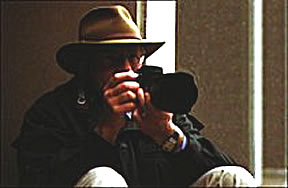
VOL. 9 NO. 3 THE MAGAZINE OF THE UNIVERSITY OF UTAH WINTER 1999-2000
 AND
FINALLY
AND
FINALLY
Hearing Voices
by Craig Denton MA'76
A newborn cries and sets in motion a lifelong hunger to find its voice. When he reaches puberty and that voice cracks, he yearns for a time when his timbre will generate public confidence. When a twenty-something toils in a garret carefully selecting words for her characters that will make them real, while trying to create an authorial persona of her own, the distinctly human search for a voice goes on.
The changing voice of a university is much the same. It sounds different at birth, puberty, and early adulthood than it does when it reaches the cusp of middle age at 150 years. For the past three years, it has been my challenge and privilege to find and articulate the voice of the University of Utah on its sesquicentennial birthday in a photographic documentary that will be published by University of Utah Press.
The challenges of articulating a voice are always daunting because voice is critical to dimension. Without a voice we are only what we appear to be on the surface. Voice gives us depth, personality, and a reciprocal sense of self. When one explores the voice of a university, one is listening to its heart beat.
Yet the University of Utah is not one voice, and identifying all its parts has been a complex task, because we are a diverse chorus.
Most immediately, we are faculty, staff, and students, and the latter rewrite their demographic description every year.
Most critically, we are financial contributors and legislative supporters.
Most fundamentally, we are alumni.
The challenges to me, the documentarian, have been troubling because they call into question my objective voice. The traditional chronicler attempts to bury the self as he constructs the narrative of the subject. Ideally, the story should tell itself and not be colored by the biases and idiosyncracies of the documentarian. The documentarian should be a dispassionate recorder that hears and sees all but lets the subject be the voice.
In reality, that is not possible. Each person comes with baggage, and all the documentarian can do is know how the self is likely interpreting what he sees and hears, based on his understanding of his cultural heredity. While I've tried to minimize myself in the sesquicentennial documentary, you'll see me and hear my voice if you survey the corners, and I should be open about it. I'm the one attempting to balance journalistic objectivity with the task of putting together the University's story, essentially an exercise in public relations. I'm a faculty member who has gripes and probably knows too much. I'm an alumnus who is a loyal supporter and who has a vested interest in the image of the University. I'm a lifelong itinerant of the U, first making contact through extension programs and being quietly sneaked into the stadium by a young father at a time when our rear ends could occupy one numbered spot on a wooden bench.
While the sesquicentennial book is not a history, many of us cannot be at the U today and not hear the echo of previous voices. My family's history is irrevocably wed to the University's like so many of yours. My maternal grandmother met her husband during an exchange arranged by the Dean of Women with officers training at Fort Douglas. My parents courted each other at the U while the cacophonous din of another war rose in the background. My wife learned to become an even better teacher in graduate school. My son and daughter carried on the family tradition. So while it's true that a person goes to college to find the self, it's also true that one legacy of 150-year-old universities is that students can hear whispers from the past and find their various selves.
The challenges to me, the ego, have been overwhelming. My voice has been assaulted at every turn. It has been a humbling experience to see the good works and innovation going on at the U. They really are more impressive than you see in the media. Hopefully, I've become a better teacher by being exposed to those who practice the profession better than I. Humbling myself further, I've introduced each section of the documentary with the voice of perhaps our most esteemed literary alumnus, Wallace Stegner BA'30. Having my text follow his prose is the height of personal folly.
So how does this voice of the University sound on its 150th birthday and how might it speak in the near future? It is a robust, resonant voice full of character. It sometimes says what others would rather not hear. It sometimes should say more. It expresses itself in a variety of modalities: from the Socratically verbal, to the visual, and increasingly, the digital. It has lost most of its provincial accent, yet it still speaks in a peculiarly Western idiom. It is a voice poised to address a larger national and international stage. It is a voice come of age.
Copyright 1999 by The University of Utah Alumni Association